 |
| Monthly Update for November 2019 |
|
|
|
|
|
|
Trump administration approves extinction plan for California fish
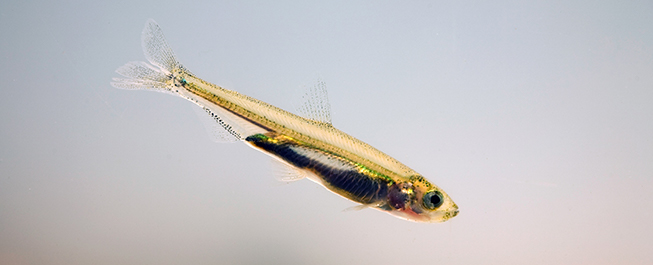
In a draft review earlier this year, federal scientists found that the Trump administration's plans for federal dams and water diversions in California would make a bad situation worse.
Trump's proposal would increase the risk of extinction for already-endangered fish and wildlife such as native Chinook salmon and Delta smelt. It would even threaten Orca whales that rely on salmon as a food source.
So the scientists determined that stronger protections must be in place. Before they could finalize their review, however, the Trump administration abruptly replaced them.
The new team reversed the draft finding, instead concluding that even more water could be taken out of the watershed without harming fish. It's yet another attempt by the Trump administration to send more water to industrial agriculture while undermining environmental protections for fish, the Bay, and the Delta.
There are still ways to fend off these federal rollbacks. We're advocating for Governor Newsom to act quickly and decisively to protect fish from Trump's dangerous plan.
Read more about how California can defend local wildlife from the Trump administration.
Pictured: A Delta smelt by Dale Kolke, CA Department of Water Resources
|
|
Tiny plastics, big pollution

Every year, 7 trillion tiny pieces of plastic flow into San Francisco Bay, making the Bay one of the worst microplastics-contaminated waterways in the country. More than a third of fish caught in the Bay have microplastics in their digestive tracts.
That's according to a new study from the San Francisco Estuary Institute and 5 Gyres. Baykeeper helped conduct this groundbreaking microplastics research with our partners by sampling the Bay's waters from aboard the Baykeeper patrol boat.
The study also found that a huge amount of microplastics are washed into the Bay by rain flowing from streets into storm drains. Nearly half are shed onto roads by car tires.
The good news is that microplastic pollution can be stopped, with the right changes in laws and policies.
Baykeeper is supporting regulations that phase out single-use plastics and packaging. We're advocating for wastewater treatment technology to remove small pollutants. And we're working for tougher requirements on cities to keep plastics, both large and micro, from washing into the Bay.
Read more about how microplastics affect San Francisco Bay.
Photo by 5 Gyres courtesy Oregon State University, Flickr/CC
|
|
Take action for the Bay in Richmond & Newark
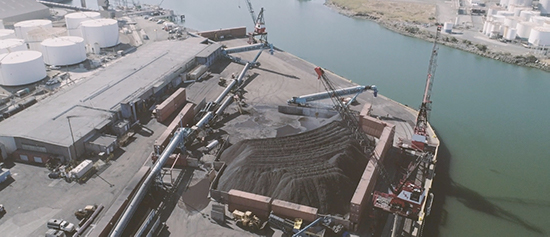
Take action for San Francisco Bay! There are two upcoming opportunities for you to tell local leaders that you support a healthy, protected Bay: one in Newark, tomorrow, November 14, and the other in Richmond on December 3.
In Newark, the City Council is considering a proposal to build a luxury development in a wetland area that's highly vulnerable to sea level rise. Come to the Newark City Council meeting tomorrow, Thursday, November 14, to urge the City Council to reject this proposal. See details and learn more about why Baykeeper is opposed to the plan.
In Richmond, the City Council is considering an ordinance to ban the handling and storage of toxic coal in Richmond—the only Bay Area city with an active coal terminal. Come voice your support for the health of the Bay and Bay Area residents on December 3 and urge Richmond to approve the ban. Learn more about the Richmond ordinance and how Baykeeper is fighting dirty fossil fuels.
Pictured: coal piles on the Bay at the Levin-Richmond facility
|
|
A message for holiday cooks & kitchen helpers
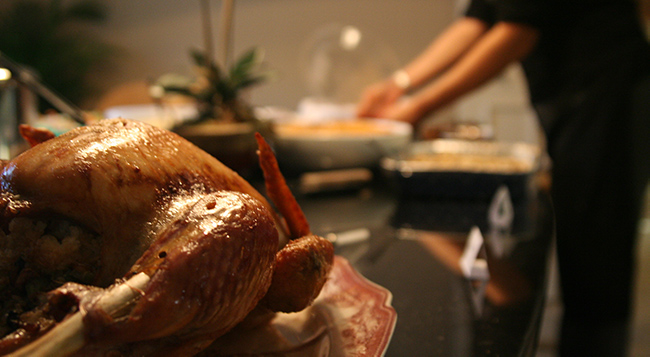
Every year, holiday cooking generates a lot of fatty waste in the form of leftover cooking oils, gravies, and creams. When dumped down sink drains, these fats harden and stick to the walls of sewer pipes running between homes and sewage facilities.
Fat-plugged sewer lines are more likely to get backed up and release sewage onto city streets and into the Bay, especially during the rainy season.
You can be a good Bay steward and make sure your delicious home-cooked meal doesn't harm the Bay by following these tips:
- Never wash solid or liquid fats down the drain or garbage disposal. That includes plant-based spreads and oils.
- Wipe down greasy pans, skillets, and gravy boats with a paper towel and dispose of the towel in the compost or trash, according to your local waste utility's instructions.
- For large quantities of fats, such as from a fryer, drop off the liquids at a designated used cooking oil recycling site.
Read more about Bay-friendly kitchen cleanup.
Photo by Shane Huang, Flickr/CC
|
|
The sharks of San Francisco Bay
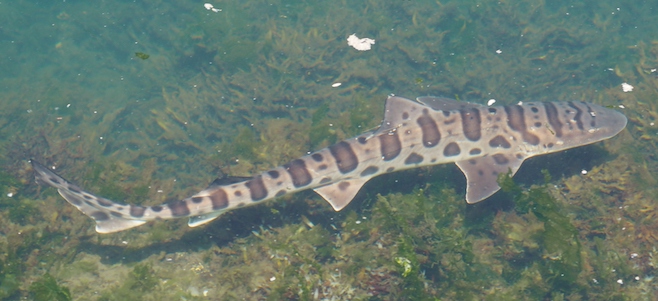
Great White sharks swim along the Pacific Coast September through December, which is why Bay Area surfers often call this season "Sharktober."
Don't worry—Great Whites rarely enter San Francisco Bay. But eleven other types of sharks live in Bay waters, though they don't typically prey on people. Since these sharks mostly hang out along the muddy bottom of the Bay, few people, including Bay swimmers, ever see one.
The Bay's most common shark, the leopard shark, lives here year-round. Named for the beautiful pattern of dark brown spots on a steel-grey body, leopard sharks can grow up to six feet long.
If you ever spot a San Francisco Bay shark, consider yourself lucky. You're not likely to be its next meal, but you'll have a great Starktober tale to tell!
Learn more about the sharks of San Francisco Bay.
Photo of a leopard shark by J. Maughn, Flickr/CC
|
|
Giving Tuesday happy hour with Anchor Brewing on December 3
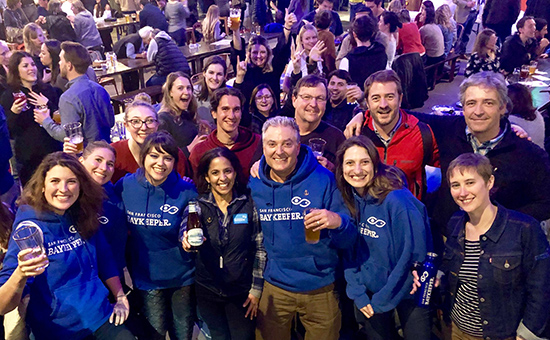
Giving Tuesday is the gratitude antidote to Black Friday. It's always the Tuesday following Thanksgiving, and this year, our friends at Anchor Brewing are holding a special Giving Tuesday happy hour for Baykeeper!
You're invited to Baykeeper's Giving Tuesday happy hour at Anchor Public Taps in San Francisco from 5-8pm on Tuesday, December 3.
Join us to raise a glass in celebration of Baykeeper's work to defend the Bay from the biggest threats. Baykeeper supporters will enjoy discounted pints, fun giveaways, and Bay trivia.
Plus, we'll be unveiling our newest partnership with Anchor Brewing in the coming week, just in time for the happy hour. We hope to see you on Giving Tuesday!
Photo of the Baykeeper team at Anchor Public Taps by Robb Most
|
|
Sports Basement special for Baykeeper supporters
 The annual Sports Basement Baykeeper special is around the corner, from Friday, December 6, to Thursday, December 12! All San Francisco Baykeeper Basementeers will get a 20% discount off their entire purchase, both at Sports Basement brick-and-mortar stores and online. The annual Sports Basement Baykeeper special is around the corner, from Friday, December 6, to Thursday, December 12! All San Francisco Baykeeper Basementeers will get a 20% discount off their entire purchase, both at Sports Basement brick-and-mortar stores and online.
And, as is true year-round, Sports Basement will donate 10% of Basementeer purchase profits to support Baykeeper's work defending the Bay.
If you're not already a Basementeer, you can still get 11% off during our discount days. But now is a great time to sign up to take advantage of the full discount! Register online or in-store by selecting San Francisco Baykeeper as your nonprofit beneficiary.
|
|
 Baykeeper on patrol Baykeeper on patrol
Baykeeper Field Investigator Cole Burchiel recently patrolled the area around Hanson Aggregates—a company we've repeatedly challenged in court for taking excessive sand from the Bay's floor. The large amount of Bay sand that they mine every year contributes to shoreline erosion and habitat loss around the Bay and along the California coast. Pictured below is a sand mining vessel nearing the Golden Gate Bridge.
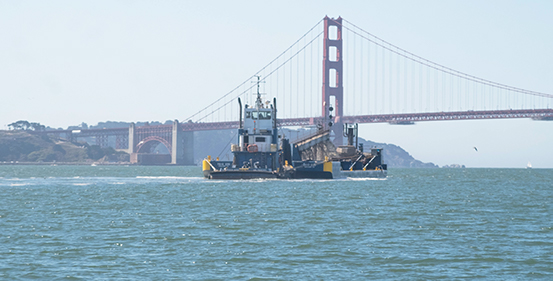
|
|
Photo at top by Robert Most
|
|
 |
|